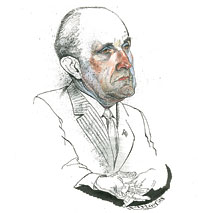
He ran a lazy, incompetent campaign. And even if Rudy Giuliani had somehow been elected, he would have been a terrible president. Still, there’s reason to miss that freakish grin. The quick, decisive flameout of Rudy ’08 is a bad thing for New York.
First the forensics. It’s amazing that in the course of a relatively short run, Giuliani managed to cram in nearly every colorful aspect of his personal and political life. There was the soaring celebrity that pushed him improbably to the top of the polls (February 2006 to December 2007), and fed an arrogance and overconfidence. There were the bizarre romantic moments (the cringe-making interview with Barbara Walters where a puppyish Giuliani eagerly agreed to let his wife sit in on Cabinet meetings; the cell-phone call from Judi while Rudy was mid-speech in front of the NRA). There was a murky, melodramatic medical crisis (a severe headache, or something, forcing Giuliani’s plane to make an emergency return to Missouri). There was the discovery of sleazy private-business dealings (with terrorist-tied Qatar) and sleazy government-romantic dealings (the shell-game accounting for Mayor Rudy’s repeated trips to the Hamptons to pursue his affair with then-girlfriend Judi; assorted sordid cameos by Bernie Kerik). There were the not-hypocritical-enough recalibrations of positions on social issues (immigration, guns, abortion) where Giuliani’s long and consistent record as mayor made him poison to conservative Republican primary voters. There was the reliance on a small group of yes-Rudy aides selected more for their loyalty to Giuliani than for any experience running a national campaign. There was a money hunger that fed an addiction to fat-cat fund-raising events over retail handshaking with voters. And finally there was the high-stakes, halfhearted, I’ll-do-it-my-way gamble of skipping the Iowa caucuses, sort-of competing in New Hampshire, and then desperately risking his entire candidacy on the Florida primary.
Yet to pin Giuliani’s collapse on any of these things (or, as Iowa senator Chuck Grassley ridiculously did, on Rudy’s deviant “New York lifestyle”—please, don’t blame the city for Giuliani’s excesses and dishonesties; his character flaws are entirely his own) is off-base. The real reasons Giuliani lost are directly related to why it’s unfortunate he’s now out of the picture. First, John McCain is more qualified for the job and he has run a better, smarter campaign ever since November. Right behind that horse-race reality, however, is the fact that the playing field changed on Giuliani: When the Iraq war receded as a concern for voters, so did interest in “America’s mayor,” the mythman born on September 11, 2001. His long-shot candidacy was premised on that image, and on the fear of another terrorist attack.
By no means am I wishing that the carnage in Iraq had continued at the devastating levels of, say, 2006. Nor do I miss the ratcheting up of Homeland Security’s threat levels. But as Wall Street has staggered and we’ve become domestically obsessed again, the shift in anxieties has allowed the candidates to dodge any serious grappling with the long-term consequences of the war, everything from how to end it to what to do about Guantánamo and Pakistan to what incursions on civil liberties are tolerable in the name of self-defense. The United States does have real enemies. Opportunistic and self-aggrandizing his entry into the campaign may have been, but Giuliani’s run was also motivated by a sincere sense of patriotism and pain forged at the World Trade Center, and by a genuine desire to protect his people. His “stay on offense” theory of anti-terrorism was simplistic, but his presence in the race had the valuable effect of pushing the conversation a little bit more toward foreign policy.
The fact that a former resident of Gracie Mansion was a real contender for president was equally important. Eighty percent of the nation’s population now lives in urban areas. Yet the senators and governor still standing only give lip service to the problems in public education, housing, transit, poverty, and crime that touch millions of city lives every day. John Edwards did more to address those issues on the campaign trail than Giuliani did, but having a former mayor of the country’s biggest, most complicated city in the presidential race injected some non-Washington grit into the mix. That’s gone now, and it’s a loss for New York. And it’s just about the only reason to regret that we won’t have Rudy Giuliani to kick around anymore.
Have good intel? Send tips to intel@nymag.com.